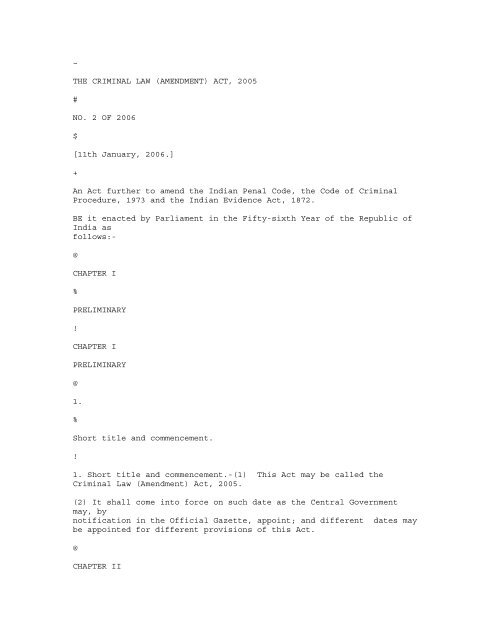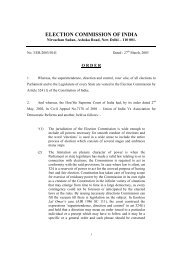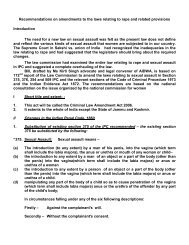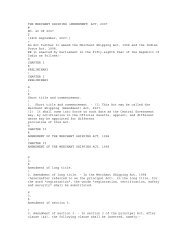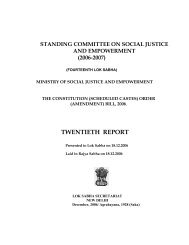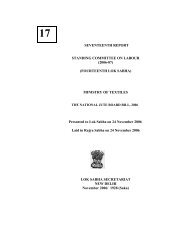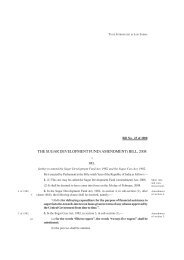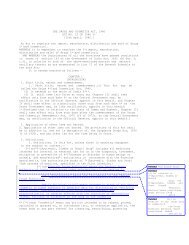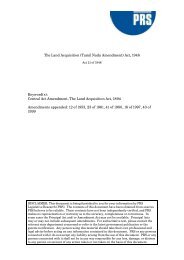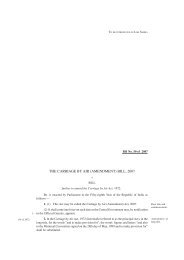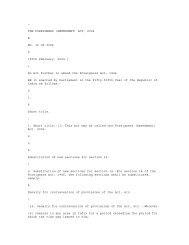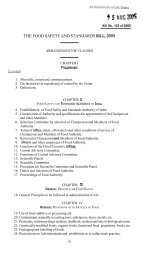THE CRIMINAL LAW (AMENDMENT) ACT, 2005 # NO. 2 OF ... - PRS
THE CRIMINAL LAW (AMENDMENT) ACT, 2005 # NO. 2 OF ... - PRS
THE CRIMINAL LAW (AMENDMENT) ACT, 2005 # NO. 2 OF ... - PRS
Create successful ePaper yourself
Turn your PDF publications into a flip-book with our unique Google optimized e-Paper software.
!3. Amendment of section 195.-In section 195 of the Code of CriminalProcedure, 1973 (2 of 1974) (hereafter in this Chapter referred to asthe Code of Criminal Procedure), in sub-section (1), for the words"except on the complaint in writing of that Court, or of some otherCourt to which that Court is subordinate", the words "except on thecomplaint in writing of that Court or by such officer of the Court asthat Court may authorise in writing in this behalf, or of some otherCourt to which that Court is subordinate" shall be substituted.@4.%Insertion of new Chapter XXIA.!4. Insertion of new Chapter XXIA.-After Chapter XXI of the Code ofCriminal Procedure, the following Chapter shall be inserted, namely:-'CHAPTER XXIAPLEA BARGAINING265A. Application of the Chapter.-(1) This Chapter shall apply inrespect of an accused against whom-(a) the report has been forwarded by the officer in charge of thepolice station under section 173 alleging therein that an offenceappears to have been committed by him other than an offence for whichthe punishment of death or of imprisonment for life or of imprisonmentfor a term exceeding seven years has been provided under the law forthe time being in force; or(b) a Magistrate has taken cognizance of an offence on complaint, otherthan an offence for which the punishment of death or of imprisonmentfor life or of imprisonment for a term exceeding seven years, has beenprovided under the law for the time being in force, and after examiningcomplainant and witnesses under section 200, issued the process undersection 204,but does not apply where such offence affects the socio-economiccondition of the country or has been committed against a woman, or achild below the age of fourteen years.(2) For the purposes of sub-section (1), the Central Government shall,by notification, determine the offences under the law for the timebeing in force which shall be the offences affecting the socio-economiccondition of the country.
265B. Application for plea bargaining.-(1) A person accused of anoffence may file an application for plea bargaining in the Court inwhich such offence is pending for trial.(2) The application under sub-section (1) shall contain a briefdescription of the case relating to which the application is filedincluding the offence to which the case relates and shall beaccompanied by an affidavit sworn by the accused stating therein thathe has voluntarily preferred, after understanding the nature and extentof punishment provided under the law for the offence, the pleabargaining in his case and that he has not previously been convicted bya Court in a case in which he had been charged with the same offence.(3) After receiving the application under sub-section (1), the Courtshall issue notice to the Public Prosecutor or the complainant of thecase, as the case may be, and to the accused to appear on the datefixed for the case.(4) When the Public Prosecutor or the complainant of the case, as thecase may be, and the accused appear on the date fixed under sub-section(3), the Court shall examine the accused in camera, where the otherparty in the case shall not be present, to satisfy itself that theaccused has filed the application voluntarily and where-(a) the Court is satisfied that the application has been filed by theaccused voluntarily, it shall provide time to the Public Prosecutor orthe complainant of the case, as the case may be, and the accused towork out a mutually satisfactory disposition of the case which mayinclude giving to the victim by the accused the compensation and otherexpenses during the case and thereafter fix the date for furtherhearing of the case;(b) the Court finds that the application has been filed involuntarilyby the accused or he has previously been convicted by a Court in a casein which he had been charged with the same offence, it shall proceedfurther in accordance with the provisions of this Code from the stagesuch application has been filed under sub-section (1).265C. Guidelines for mutually satisfactory disposition.-In working outa mutually satisfactory disposition under clause (a) of sub-section (4)of section 265B, the Court shall follow the following procedure,namely:-(a) in a case instituted on a police report, the Court shall issuenotice to the Public Prosecutor, the police officer who hasinvestigated the case, the accused and the victim of the case toparticipate in the meeting to work out a satisfactory disposition ofthe case:Provided that throughout such process of working out a satisfactorydisposition of the case, it shall be the duty of the Court to ensurethat the entire process is completed voluntarily by the partiesparticipating in the meeting:Provided further that the accused may, if he so desires, participate insuch meeting with his pleader, if any, engaged in the case;
(b) in a case instituted otherwise than on police report, the Courtshall issue notice to the accused and the victim of the case toparticipate in a meeting to work out a satisfactory disposition of thecase:Provided that it shall be the duty of the Court to ensure, throughoutsuch process of working out a satisfactory disposition of the case,that it is completed voluntarily by the parties participating in themeeting:Provided further that if the victim of the case or the accused, as thecase may be, so desires, he may participate in such meeting with hispleader engaged in the case.265D. Report of the mutually satisfactory disposition to be submittedbefore the Court.-Where in a meeting under section 265C, a satisfactorydisposition of the case has been worked out, the Court shall prepare areport of such disposition which shall be signed by the presidingofficer of the Court and all other persons who participated in themeeting and if no such disposition has been worked out, the Court shallrecord such observation and proceed further in accordance with theprovisions of this Code from the stage the application under subsection(1) of section 265B has been filed in such case.265E. Disposal of the case.-Where a satisfactory disposition of thecase has been worked out under section 265D, the Court shall dispose ofthe case in the following manner, namely:-(a) the Court shall award the compensation to the victim in accordancewith the disposition under section 265D and hear the parties on thequantum of the punishment, releasing of the accused on probation ofgood conduct or after admonition under section 360 or for dealing withthe accused under the provisions of the Probation of Offenders Act,1958 (20 of 1958) or any other law for the time being in force andfollow the procedure specified in the succeeding clauses for imposingthe punishment on the accused;(b) after hearing the parties under clause (a), if the Court is of theview that section 360 or the provisions of the Probation of OffendersAct, 1958 (20 of 1958) or any other law for the time being in forceare attracted in the case of the accused, it may release the accused onprobation or provide the benefit of any such law, as the case may be;(c) after hearing the parties under clause (b), if the Court finds thatminimum punishment has been provided under the law for the offencecommitted by the accused, it may sentence the accused to half of suchminimum punishment;(d) in case after hearing the parties under clause (b), the Court findsthat the offence committed by the accused is not covered under clause(b) or clause (c), then, it may sentence the accused to one-fourth ofthe punishment provided or extendable, as the case may be, for suchoffence.265F. Judgment of the Court.-The Court shall deliver its judgment interms of section 265E in the open Court and the same shall be signed bythe presiding officer of the Court.
265G. Finality of the judgment.-The judgment delivered by the Courtunder section 265G shall be final and no appeal (except the specialleave petition under article 136 and writ petition under articles 226and 227 of the Constitution) shall lie in any Court against suchjudgment.265H. Power of the Court in plea bargaining.-A Court shall have, forthe purposes of discharging its functions under this Chapter, all thepowers vested in respect of bail, trial of offences and other mattersrelating to the disposal of a case in such Court under this Code.265-I. Period of detention undergone by the accused to be set offagainst the sentence of imprisonment.-The provisions of section 428shall apply, for setting off the period of detention undergone by theaccused against the sentence of imprisonment imposed under thisChapter, in the same manner as they apply in respect of theimprisonment under other provisions of this Code.265J. Savings.-The provisions of this Chapter shall have effectnotwithstanding anything inconsistent therewith contained in any otherprovisions of this Code and nothing in such other provisions shall beconstrued to constrain the meaning of any provision of this Chapter.Explanation.-For the purposes of this Chapter, the expression "PublicProsecutor" has the meaning assigned to it under clause (u) of section2 and includes an Assistant Public Prosecutor appointed under section25.265K. Statements of accused not to be used.-Notwithstanding anythingcontained in any law for the time being in force, the statements orfacts stated by an accused in an application for plea bargaining filedunder section 265B shall not be used for any other purpose except forthe purpose of this Chapter.265L. Non-application of the Chapter.-Nothing in this Chapter shallapply to any juvenile or child as defined in clause (k) of section 2 ofthe Juvenile Justice (Care and Protection of Children) Act, 2000.".@5.%Amendment of section 292.!5. Amendment of section 292.-In section 292 of the Code of CriminalProcedure,-(a) in sub-section (1), for the portion beginning with the words"gazetted officer" and ending with the brackets and words "(includingthe officer of the Controller of Stamps and Stationery)", the followingshall be substituted, namely:-"officer of any Mint or of any Note Printing Press or of any SecurityPrinting Press (including the officer of the Controller of Stamps and
Stationery) or of any Forensic Department or Division of ForensicScience Laboratory or any Government Examiner of Questioned Documentsor any State Examiner of Questioned Documents, as the case may be,";(b) in sub-section (3), for the portion beginning with the words"except with" and ending with the words "as the case may be,", thefollowing shall be substituted, namely:-"except with the permission of the General Manager or any officer incharge of any Mint or of any Note Printing Press or of any SecurityPrinting Press or of any Forensic Department or any officer in chargeof the Forensic Science Laboratory or of the Government Examiner ofQuestioned Documents Organisation or of the State Examiner ofQuestioned Documents Organisation, as the case may be,".@6.%Amendment of section 340.!6. Amendment of section 340.-In section 340 of the Code of CriminalProcedure, in sub-section (3), for clause (b), the following clauseshall be substituted, namely:-"(b) in any other case, by the presiding officer of the Court or bysuch officer of the Court as the Court may authorise in writing in thisbehalf.".@7.%Amendment of the First Schedule.!7. Amendment of the First Schedule.-In the First Schedule to the Codeof Criminal Procedure, under the heading"I.-<strong>OF</strong>FENCES UNDER <strong>THE</strong> INDIAN PENAL CODE,"-(a) after the entries relating to section 195, the following entriesshall be inserted, namely:---------------------------------------------------------------------------------1 2 3 4 56
falsis t--------------------------------------------------------------------------------"195A Threatening any Imprisonment for Cognizable Non-bail- Court byperson to give 7 years, or fine, able which offenfalse evidence. or both.of givingIf innocent The same as for Ditto Ditto Ditto.",Person isConvicted andsentenced inconsequence offalse evidencewith death, orimprisonmentfor more thanseven years.the offence.--------------------------------------------------------------------------------(b) in the 4th column, in the entry relating to section 196, for theword "Ditto", the word "Non-cognizable" shall be substituted.'.@8.%Omission of section 25 of Act 25 of <strong>2005</strong>.!8. Omission of section 25 of Act 25 of <strong>2005</strong>.-Section 25 of the Code ofCriminal Procedure (Amendment) Act, <strong>2005</strong> shall be omitted.@CHAPTER IV%


